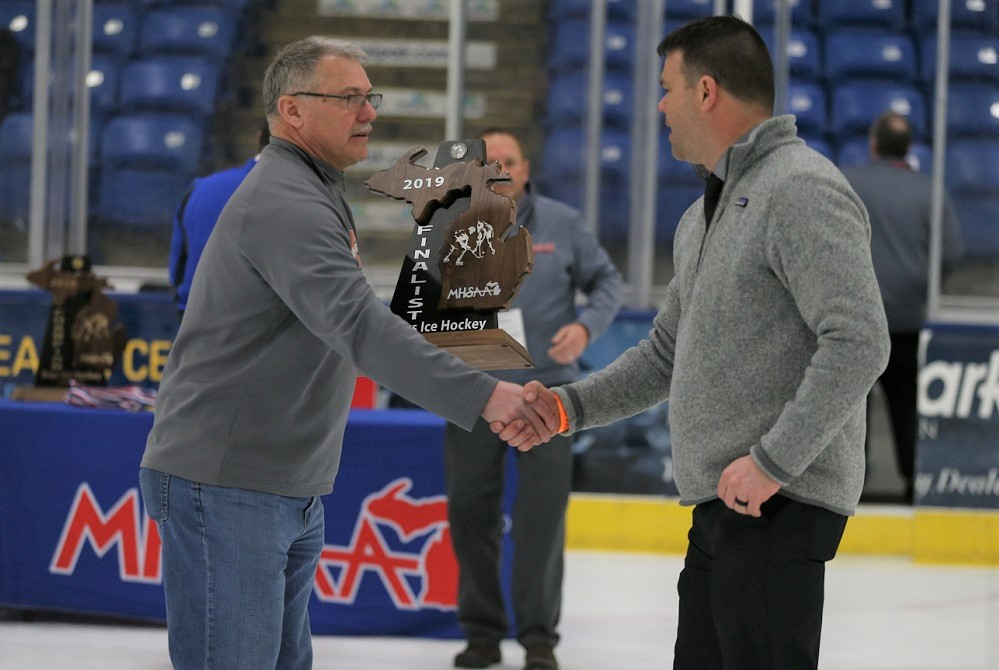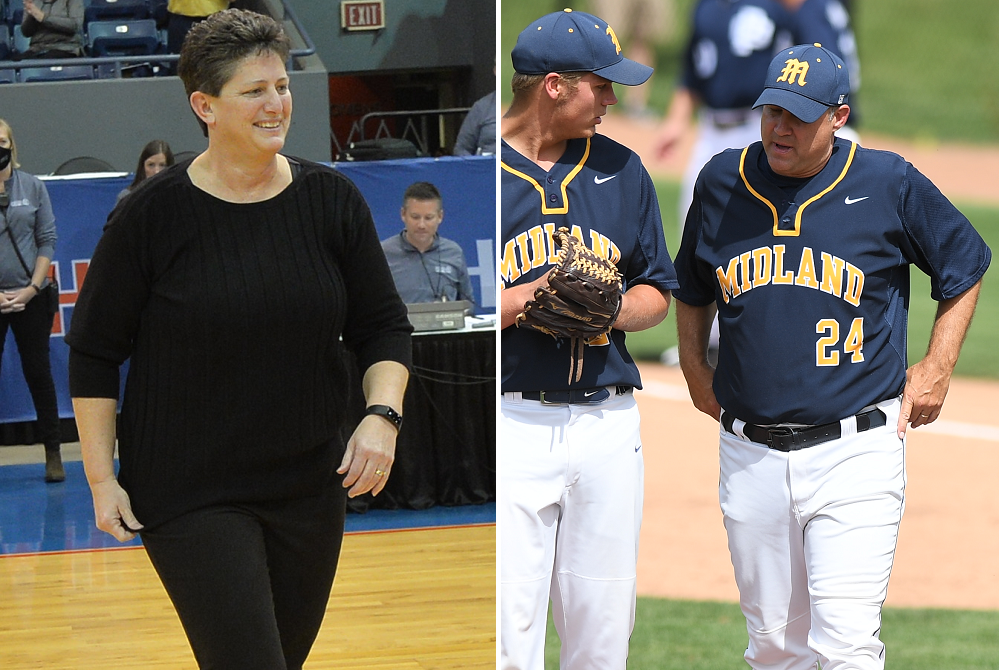
Hockey Star-Turned-Champion for School Sports to Receive MHSAA's Forsythe Award
By
Geoff Kimmerly
MHSAA.com senior editor
March 11, 2022
Once or twice a year, Bruce Horsch gets the question – mostly during a Winter Olympics year or after someone has watched “Miracle on Ice” and found out the “Horsch” that is mentioned twice is actually the recently-retired Houghton High School athletic director.
The final goaltender cut from the 1980 U.S. hockey team that went on to stun the world in winning Olympic gold, Horsch went on to coach at multiple college programs before becoming Houghton’s athletic director in 1996 at the age of 40.
These days, many also know him for the commitment, mentorship and leadership shown in that position through his retirement in 2019.
To celebrate his many contributions to interscholastic athletics, Horsch has been named the 2022 honoree for the Michigan High School Athletic Association’s Charles E. Forsythe Award.
 The annual award is in its 45th year and named after former MHSAA Executive Director Charles E. Forsythe, the Association's first full-time and longest-serving chief executive. Forsythe Award recipients are selected each year by the MHSAA Representative Council, based on an individual's outstanding contributions to the interscholastic athletics community.
The annual award is in its 45th year and named after former MHSAA Executive Director Charles E. Forsythe, the Association's first full-time and longest-serving chief executive. Forsythe Award recipients are selected each year by the MHSAA Representative Council, based on an individual's outstanding contributions to the interscholastic athletics community.
Horsch was described as a “not in the spotlight guy” by one of those who recommended him for the Forsythe Award, but he certainly spent time there. Horsch was a college hockey star and NHL draft pick, and had begun his minor league hockey career before playing with the U.S. team right up until the final cuts on the way to Lake Placid, N.Y.
After his playing days concluded, he coached collegiately before eventually settling in as Houghton’s athletic director for the 1996-97 school year.
“I was fortunate enough to play at Michigan Tech, and I was on a national championship team (in 1975) and I was on a national runner-up team (in 1976). When you played for (coach) John MacInnes up here, it wasn’t individuals – although we had great individuals – we won because we were a team” Horsch said.
“I’m not out for recognition. I enjoy being part of a team. I enjoy working with other people, and that’s my satisfaction.”
He led many important ones in his roles as a school sports administrator.
Horsch was named his region’s Athletic Director of the Year in both 2003 and 2019 by the Michigan Interscholastic Athletic Administrators Association (MIAAA), and served on the Upper Peninsula Athletic Committee from 2001-05. He has been an active member of the MIAAA, National Interscholastic Athletic Administrators Association (NIAAA) and Upper Peninsula Athletic Directors Association (UPADA), serving as secretary and president of the UPADA.
He also served as president of the Keweenaw Area Athletic Directors Association and secretary and commissioner of the Western Peninsula Athletic Conference.
“For years Bruce was one of the most respected voices not only in the Upper Peninsula but also the entire state,” MHSAA Executive Director Mark Uyl said. “He brought that perspective as a high-end athlete and transitioned extremely well as an educator and athletic director.”
Horsch was a frequent host of MHSAA Tournaments at the District and Regional rounds during his time at Houghton, and also hosted MHSAA Upper Peninsula Finals. He served as a host for sessions of the MHSAA PACE program, the coaching education program predecessor to the current Coaches Advancement Program (CAP).
His dedication to Houghton athletics was further noted when he considered retiring in 2017 but stayed on two more years to assist with a bond that resulted in in the upgrading of the school’s football field and track and building of softball and baseball fields as part of the athletic complex. Previously, he had led a referendum to have a second gymnasium built to provide an additional practice venue with girls basketball moving from the fall to winter season beginning with the 2007-08 school year.
“I’m proud of the fact that in the U.P. there are not many, if any schools that have the facilities that Houghton High School has,” Horsch said.
Horsch is a graduate of Hastings High School in Minnesota and earned a bachelor’s degree in business administration from Michigan Technological University. He led the Huskies hockey team to 58 victories in goal over four seasons and was part of the 1975 NCAA championship team, two of many reasons he was inducted into the Michigan Tech Sports Hall of Fame in 2007. He was drafted by the Montreal Canadiens during the ninth round of the 1976 NHL draft and played minor league hockey for two seasons. He then coached hockey collegiately for most of the 1980s as an assistant at Ferris State and then Michigan Tech.
He has continued to serve his community as a member of the Rotary Club of Houghton.
Past recipients of the Charles E. Forsythe Award
1978 - Brick Fowler, Port Huron; Paul Smarks, Warren
1979 - Earl Messner, Reed City; Howard Beatty, Saginaw
1980 - Max Carey, Freesoil
1981 - Steven Sluka, Grand Haven; Samuel Madden, Detroit
1982 - Ernest Buckholz, Mt. Clemens; T. Arthur Treloar, Petoskey
1983 - Leroy Dues, Detroit; Richard Maher, Sturgis
1984 - William Hart, Marquette; Donald Stamats, Caro
1985 - John Cotton, Farmington; Robert James, Warren
1986 - William Robinson, Detroit; Irving Soderland, Norway
1987 - Jack Streidl, Plainwell; Wayne Hellenga, Decatur
1988 - Jack Johnson, Dearborn; Alan Williams, North Adams
1989 - Walter Bazylewicz, Berkley; Dennis Kiley, Jackson
1990 - Webster Morrison, Pickford; Herbert Quade, Benton Harbor
1991 - Clifford Buckmaster, Petoskey; Donald Domke, Northville
1992 - William Maskill, Kalamazoo; Thomas G. McShannock, Muskegon
1993 - Roy A. Allen Jr., Detroit; John Duncan, Cedarville
1994 - Kermit Ambrose, Royal Oak
1995 - Bob Perry, Lowell
1996 - Charles H. Jones, Royal Oak
1997 - Michael A. Foster, Richland; Robert G. Grimes, Battle Creek
1998 - Lofton C. Greene, River Rouge; Joseph J. Todey, Essexville
1999 - Bernie Larson, Battle Creek
2000 - Blake Hagman, Kalamazoo; Jerry Cvengros, Escanaba
2001 - Norm Johnson, Bangor; George Lovich, Canton
2002 - John Fundukian, Novi
2003 - Ken Semelsberger, Port Huron
2004 - Marco Marcet, Frankenmuth
2005 - Jim Feldkamp, Troy
2006 - Dan McShannock, Midland; Dail Prucka, Monroe
2007 - Keith Eldred, Williamston; Tom Hickman, Spring Lake
2008 - Jamie Gent, Haslett; William Newkirk, Sanford Meridian
2009 - Paul Ellinger, Cheboygan
2010 - Rudy Godefroidt, Hemlock; Mike Boyd, Waterford
2011 - Eric C. Federico, Trenton
2012 - Bill Mick, Midland
2013 - Jim Gilmore, Tecumseh; Dave Hutton, Grandville
2014 - Dan Flynn, Escanaba
2015 - Hugh Matson, Saginaw
2016 - Gary Hice, Petoskey; Gina Mazzolini, Lansing
2017 - Chuck Nurek, Rochester Hills
2018 - Gary Ellis, Allegan
2019 - Jim Derocher, Negaunee; Fredrick J. Smith, Stevensville
2020 - Michael Garvey, Lawton
2021 – Leroy Hackley Jr., Byron Center; Patti Tibaldi, Traverse City
PHOTO: Houghton athletic director Bruce Horsch, left, hands coach Corey Markham the Division 3 finalist trophy after the Gremlins finished Division 3 hockey runners-up in 2019.

2023 Bush Award Honorees Groat, Albright, Show Dedication in Multiple Roles
By
Geoff Kimmerly
MHSAA.com senior editor
August 3, 2023
Battle Creek St. Philip’s Vicky Groat and Midland High’s Eric Albright both have devoted themselves to Michigan school sports for multiple decades – and both continue to lead as highly-successful coaches while also serving in multiple administrative roles within their schools and as important voices in statewide leadership as well.
To recognize their dedication and far-reaching contributions to educational athletics, Groat and Albright have been named recipients of the Michigan High School Athletic Association’s Allen W. Bush Award for 2023.
Al Bush served as executive director of the MHSAA for 10 years. The award honors individuals for past and continuing service to school athletics as a coach, administrator, official, trainer, doctor or member of the media. The award was developed to bring recognition to people who are giving and serving without a lot of attention. This is the 32nd year of the award.
Groat will enter this fall’s girls volleyball season with a career coaching record of 1,240-304-95, ranking seventh on the MHSAA coaching wins list for her sport. She took over for her mother, equally-legendary Sheila Guerra, for the 1997-98 winter season, stepped away briefly after her second year, and returned to lead the program again in 2000-01. Groat has guided the Tigers to 14 MHSAA Finals championships, including a record nine straight in Class D from Winter 2006-07 through Fall 2014 (volleyball moved to the fall with the 2007-08 school year), and most recently guided St. Philip to back-to-back Division 4 championships to cap the 2020 and 2021 seasons.
A 1985 graduate of the school, Groat is entering her 17th year as the athletic director and also took over as principal on an interim basis in December 2014 and then permanently to begin the 2016-17 school year. She previously had served as the school’s student services director and as an assistant principal. She also served on the MHSAA Representative Council from 2016-20 and is a longtime leader as part of the Michigan Interscholastic Volleyball Coaches Association (MIVCA).
Groat is a member of the Battle Creek St. Philip Athletic and MIVCA Halls of Fame. She was named Michigan High School Coaches Association volleyball Coach of the Year in 2009, and the national Coach of the Year for her sport by the National High School Athletic Coaches Association in 2021. She earned her bachelor's degree from Central Michigan University in 1989 and master’s from Fort Hays State University (Kan.) in 2019.
“Vicky Groat has established herself as one of the most accomplished volleyball coaches in the state and also wears multiple difficult hats so well as the athletic director and principal,” MHSAA Executive Director Mark Uyl said. “Her passion for St. Philip school and its students is evident at every turn, and her desire to help all students excel has been a great benefit to her school and throughout Michigan.”
Albright came to Michigan from Minnesota, graduating from Royalton High School in 1992 and then Hamline University with his bachelor’s degree in 1996. He began at Midland High as a teacher in 1997 and continued in the classroom through 2013-14, adding the varsity baseball coaching job in 2003 and building a 520-199 record over the last two decades while also leading the Chemics to seven league and four District titles and a Division 1 Semifinals appearance in 2018. He became the school’s athletic director in 2010 and serves as an assistant principal as well.
Midland has hosted various MHSAA postseason events under Albright’s direction, including Finals tennis, Semifinals in soccer and football and Quarterfinals for basketball, softball and volleyball. Albright has served on seven committees or task forces for the Association and as part of the Representative Council since 2019.
Albright also is beginning his tenure as president of the Michigan Interscholastic Athletic Administrators Association (MIAAA) and is a Leadership Training Course instructor for the National Interscholastic Athletic Administrators Association (NIAAA). He received a master’s degree from Central Michigan University in 2000 and earned a certified athletic administrator designation from the NIAAA in 2013. Albright also has been an MHSAA registered official in basketball and baseball over the last two decades, most recently in both sports since 2018-19. He worked as a professional baseball umpire in the Gulf Coast League during the 1997 season before beginning his tenure at Midland.
“Eric Albright is a leader in school-based athletics across Michigan with his work with the MIAAA and MHSAA, and he’s become a go-to person for other athletic directors statewide,” Uyl said. “He has worked tirelessly to provide a wealth of guidance and vision, continuously demonstrating his passion for educational athletics.”
PHOTOS Battle Creek St. Philip volleyball coach Vicky Groat steps on the court to receive her team's Division 4 championship trophy in 2021, and Midland's Eric Albright (far right) confers with his pitcher during the 2018 Division 1 Baseball Semifinals.

